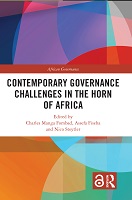Chapter 3 Federal systems of governance in Africa
Proposal review
Patterns and pitfalls
Abstract
Federalism as a mode of governance has been a popular response to most conflicts which stemmed from ethnic/language/religious mobilisation. However, the track record of resolving communal or identity conflicts has not always been good, the least of all in Somalia, Sudan and South Sudan. Why the lack of success? Is the federal solution inherently inappropriate for communal accommodation by exacerbating the problem? If not inevitably or inherently inappropriate, is it then a question of poor design? Or is it merely ineffectual implementation of the ‘federal solution’? The chapter argues that federal arrangements in Africa have been the last measure to hold countries together; therefore federalism per se cannot blamed for persistent conflicts. Whether federalism is able to address communal conflicts depends much on constitutional designs dealing with both ethnic issues and federal concepts in general. Where federal solutions have been tried, it is highly centralised, and even then often superficially and reluctantly implemented. To judge the efficacy of federal arrangements in constitutions they first must be implemented. This depends again on a broader embrace of constitutionalism; democracy, separation of powers, limited government, and the rule of law have to become part of political/legal culture of a country.
Keywords
Federal Systems, Governance, AfricaDOI
10.4324/9781003265306-3ISBN
9781032207926, 9781032207995, 9781003265306Publisher
Taylor & FrancisPublisher website
https://taylorandfrancis.com/Publication date and place
2023Grantor
Imprint
RoutledgeClassification
Government powers
Peace studies and conflict resolution
Politics and government


 Download
Download